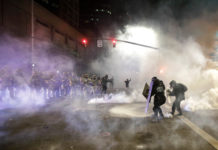If someone is accused of being racist or transphobic they are rarely given a chance to defend themselves
I’m disappointed that Bari Weiss has resigned from the New York Times and not just because she was one of the few voices of reason on the paper. A while ago, I flew to New York at Bari’s request to be interviewed by her for a forthcoming profile of a group of maverick writers and intellectuals in what was billed as a follow-up to her famous piece on the ‘Intellectual Dark Web’ — a kind of Junior College branch.
Among those to be featured were the African American essayist Coleman Hughes; the Australian editor-in-chief of Quillette, Claire Lehmann; and the Swedish columnist Paulina Neuding. We spent an enjoyable afternoon together at the Times building on Eighth Avenue, having our photographs taken and being wined and dined by Weiss in the boardroom. I was looking forward to seeing the piece.
In truth, it probably wouldn’t have appeared even if she’d stuck around. The people Weiss wanted to include in her piece are all non-woke and, according to the new orthodoxy at the Times, that means we might as well be wearing white hoods, including Coleman.
As Weiss wrote in her resignation letter: ‘Op-eds that would have easily been published just two years ago would now get an editor or a writer in serious trouble, if not fired. If a piece is perceived as likely to inspire backlash internally or on social media, the editor or writer avoids pitching it. If she feels strongly enough to suggest it, she is quickly steered to safer ground. And if, every now and then, she succeeds in getting a piece published that does not explicitly promote progressive causes, it happens only after every line is carefully massaged, negotiated and caveated.’
Weiss’s resignation letter was the second broadside in the space of a week aimed at the witchfinders-general of the public square. The first was the letter in Harper’s signed by 153 liberal muckety-mucks.
Toby Young – Spectator | USA – July 19, 2020.




